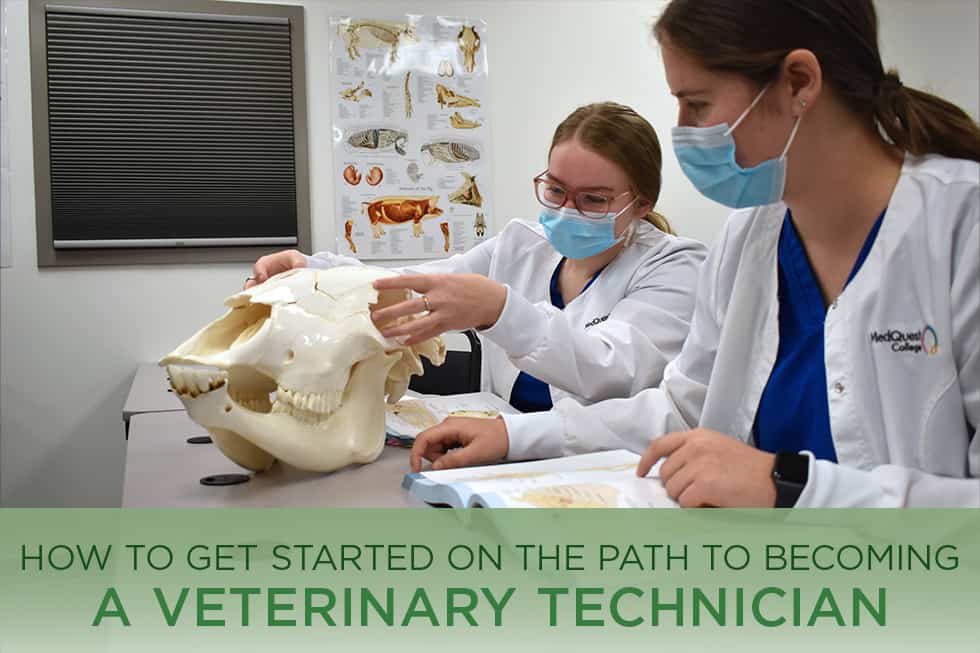Are you an animal lover who dreams of a career helping the very critters you love? If that sounds right up your alley, except for the lengthy and more costly route of becoming a full-fledged veterinarian, you might want to consider becoming a veterinary technician (vet tech). Becoming a vet tech is a great way to make a difference in the lives of animals but doesn’t take years and years to do it. Let’s explore the things you need to know to get on the path to a future that’s all about helping the furry friends you love for a living!
Do Your Research
Before jumping headfirst into any field, it’s important to gain a better understanding of the industry and the requirements needed to reach your goals.
Start by researching what a vet tech does, their job responsibilities, and the skills you’ll need to be successful. Understanding the job duties and expectations of a vet tech upfront can help you determine if it’s the right career path for you. You should also research where vet techs work and think about what type of organization suits you the best. And finally, check out the job market and salary for vet techs in your area.
Doing your research upfront can help you make an informed decision about your career and set you up for success. To give you a bit of a head-start, let’s break it down.
Typical Duties of a Vet Tech
Vet techs provide a wide range of support services under the direction of a licensed veterinarian. You can expect to perform all or some of the following duties as a vet tech:
- Office Procedures: maintaining client relations, communication management, and understanding veterinary law and ethics
- Pharmacy and Pharmacology: administration and medication dispensal
- Nursing: patient assessment and patient care (husbandry, nutrition, therapeutics, and dentistry)
- Anesthesia: patient management and equipment/facility management
- Surgical Nursing: patient management and procedural management
- Laboratory Procedures: specimen management and specimen analysis
- Imaging: capturing and processing radiographs
- Laboratory Animal Procedures
- Avian, Exotic and Small Mammals Procedures
Where Do Vet Techs Work?
You’ll find vet techs working in private veterinary practices, emergency vet clinics, animal hospitals, shelters, zoos, research facilities, and even on farms caring for livestock. You can imagine each setting is quite different, so consider where you see yourself thriving as a vet tech.
What are the Training and Education Requirements?
It’s also important to research the different programs and schools in your area that offer veterinary technology degrees. Look into their curriculum, accreditation, and graduation rates. This will help you find a program that fits your needs and provides you with the education necessary to become a successful vet tech. However, becoming a vet tech usually requires completing at a minimum, an accredited two-year associate degree program. In addition, many employers prefer to hire vet techs who are licensed. To obtain licensure, graduates of an approved vet tech program must successfully pass the Veterinary Technology National Examination (VTNE).
How to Prepare for a Career as a Vet Tech
It’s a good idea to try and get some experience working with animals prior to launching your career as a vet tech. Consider volunteering at a local animal shelter or rescue organization. Animal shelters and rescue organizations always need volunteers to help care for animals. This may include walking dogs, cleaning cages, and assisting with medical care. By volunteering, you can gain practical experience working with a variety of animals and get an idea of what it’s like to work in a fast-paced, high-stress environment.
You can also work with a pet-sitting or dog-walking company to gain experience. This type of work involves caring for pets while their owners are away. It can provide you with experience working with animals in different environments, such as in-home or outdoor settings.
Select a Program and Get Your Training
When looking for a program, make sure it is accredited by the American Veterinary Medical Association (AVMA). This accreditation ensures that the program meets certain standards and that you will be eligible to take the VTNE upon completion. You should also consider logistical factors such as location, cost, and program length before you select a program. Ask about financial aid options, and any career placement services that might be available after you graduate.
Get Certified
In addition to passing the VTNE, many states require vet techs to become licensed in order to practice. The requirements for licensing vary by state, but usually involve passing a state-specific exam and meeting other requirements such as education and experience. But getting certified demonstrates to employers and clients that you’ve met a certain level of education and skill. It can also provide opportunities for advancement in your career and potentially lead to higher salaries. In some states, being certified is required to work as a vet tech.
Start Your Career!
Once you’ve done all the hard work and are a certified vet tech, the next step is to start your career in the field you love. To get your future off to the best start, make networking a priority.
This is one of the best ways to find job openings and also allows you to interact and engage with other vet techs and veterinarians in your area. Attend job fairs or industry conferences to meet new people and make connections.
Caring for animals might be one of the best careers out there. And with some dedication and hard work, you can join the ranks of the talented vet techs out there living their dream of doing what they love for a living. If you’d like to learn more about a career as a vet tech, check out the Veterinary Technology Program at MedQuest College. With a 24-month associate degree program, MedQuest is putting animal lovers just like you on the path to futures in veterinary technology. Contact us today for more information.

